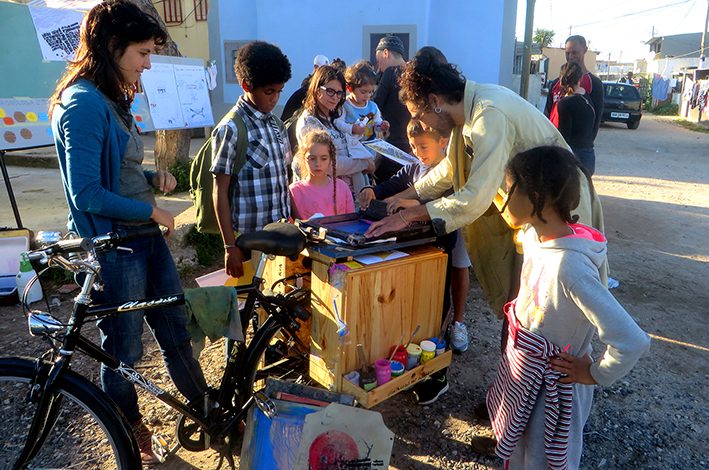The Social Art Award 2017
Can art change the world?
Under this question, the Institute for Art and Innovation e.V. had launched the first Social Art Award in 2017. Artists and cultural actors of all areas were invited to apply with their work to the field of social art. Artists from 131 countries responded with extraordinary works and projects.
On September 5, 2017, the three winners Lino Tonelotto from France, Quek Jia Qi from Singapore and Diogo da Cruz from Portugal were honored, and exhibited at WHITECONCEPTS Gallery in Berlin. They demonstrated with their politically engaged works that art can make current events visible and tangible. This is an important understanding for bringing forward the debate and thus a social change.
Learn more about it and get your copy of the Social Art Award Book (116 pages, English) featuring the Top50 artists.
To Order:
Printed Version (Softcover) – 25 EUR excl. delivery
E-Version – Free
See here the best entries:
ATELIER SER
AtelierSER
Atelier SER - Spontaneous Art Movement, is a collective of two portuguese fine artists. Their performative intervention turns any street into a common space that brings locals together. It makes them experience a creative process and stimulates new visions on social and environmental challenges. The performance itself is a portable silkscreen workshop run on a bicycle. The bicycle is converted into an itinerant atelier, that makes the art of silkscreen visible to general public and lets the printing process spontaneously happen on the street. Passers-by are playfully introduced to the artistic handcraft and taught how to screenprint with their own hands. Provided with two meshes ready to use, they put their curiosity into practice straightaway and turn any kind of fabric into a printed art object. Prior to each performance, the visual images provided on the two meshes are devised through a collaborative and participatory process inside the community. Therefore, the artists spend lively time with the community: they develop an understanding of the community´s specific characteristics and challenges by what they learn from observing the surroundings, from actively listening and talking to the citizens and from attending local initiatives. Inspired herefrom, the artists create a visual message for this specific community. It maps the territory, the relations between neighbours and adresses particular concerns specific to the community such as, for example, a local referendum. The impact generated comprises several aspects: Firstly, the workshop allows all kind of people to be part of and express themselves in a creative process. People who may not otherwise engage in the arts, become not only observers, but also editors of the silkscreen art work. Secondly, the itinerant atelier serves as a low-threshold platform for spontaneous communication and interaction between residents, commuters or even tourists. Hence, the bicycle workshop turns public space into a common space where people – driven by their curiosity – get together, learn, print, discuss, enjoy, inspire and get inspired. Thirdly, public attention is drawn to the bicycle as an object that has not yet become a commonly accepted mode of transport in Portugal respectively Lisbon. As the bicycle functions at the center of the performance, it gets noticed by the passers-by and becomes an integrated part of the communitary landscape. Thus, visions for environmentally friendly approaches are not only voiced by possible visual messages of the screenprint or by providing possibilities to upcycle old fabrics, but are also constantly and inherently promoted by choosing the bicycle as the base of the atelier.
Atelier SER - Spontaneous Art Movement, is a collective of two portuguese fine artists. Their performative intervention turns any street into a common space that brings locals together. It makes them experience a creative process and stimulates new visions on social and environmental challenges. The performance itself is a portable silkscreen workshop run on a bicycle. The bicycle is converted into an itinerant atelier, that makes the art of silkscreen visible to general public and lets the printing process spontaneously happen on the street. Passers-by are playfully introduced to the artistic handcraft and taught how to screenprint with their own hands. Provided with two meshes ready to use, they put their curiosity into practice straightaway and turn any kind of fabric into a printed art object. Prior to each performance, the visual images provided on the two meshes are devised through a collaborative and participatory process inside the community. Therefore, the artists spend lively time with the community: they develop an understanding of the community´s specific characteristics and challenges by what they learn from observing the surroundings, from actively listening and talking to the citizens and from attending local initiatives. Inspired herefrom, the artists create a visual message for this specific community. It maps the territory, the relations between neighbours and adresses particular concerns specific to the community such as, for example, a local referendum. The impact generated comprises several aspects: Firstly, the workshop allows all kind of people to be part of and express themselves in a creative process. People who may not otherwise engage in the arts, become not only observers, but also editors of the silkscreen art work. Secondly, the itinerant atelier serves as a low-threshold platform for spontaneous communication and interaction between residents, commuters or even tourists. Hence, the bicycle workshop turns public space into a common space where people – driven by their curiosity – get together, learn, print, discuss, enjoy, inspire and get inspired. Thirdly, public attention is drawn to the bicycle as an object that has not yet become a commonly accepted mode of transport in Portugal respectively Lisbon. As the bicycle functions at the center of the performance, it gets noticed by the passers-by and becomes an integrated part of the communitary landscape. Thus, visions for environmentally friendly approaches are not only voiced by possible visual messages of the screenprint or by providing possibilities to upcycle old fabrics, but are also constantly and inherently promoted by choosing the bicycle as the base of the atelier.



